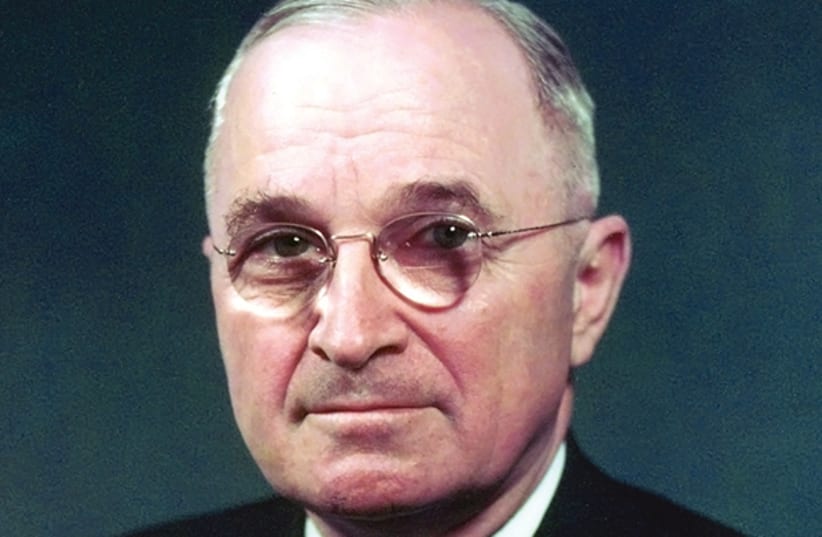On July 20, 1944, Americans woke to the startling news that an attempt had been made on the life of Adolf Hitler. The Nazi leader survived the attack but feared for his safety, heeding the advice of his cabinet never to speak in public again.
On that same day, thousands of miles across the ocean, delegates, including Senator Harry S. Truman of Missouri, began arriving at the Democratic National Convention in Chicago to nominate President Franklin D. Roosevelt to a fourth term. Truman’s assignment was to deliver the speech nominating Sen. Jimmy Byrnes as FDR’s vice president to replace the sitting VP Henry Wallace.
However, unbeknown to the public, a few weeks before the convention, Roosevelt’s cardiologist, following an extensive examination, informed his senior staff that even with the best of care the President might not live a year. This dramatic turn of events meant that the selection of a vice president was of crucial significance to the country and the world.
The White House, seeking options to Henry Wallace, reached out to Truman in the president’s name to abandon Byrnes and to run for vice president himself. Truman, astounded by the request, agreed and miraculously, though a virtual unknown to the American public, resoundingly defeated Henry Wallace in the second ballot by a count of 1,031 to 105 to win the nomination for the vice presidency.
Nine months later, Roosevelt died and Harry Truman, a man with little experience in foreign affairs, assumed the tall order of uniting the Allies, winning the war, restoring the shattered global economy, and creating a new world order. He excelled in almost all of it.
In 1948, I attended a rally on the Lower East Side of New York. When the crowd began chanting, “Give ‘em hell, Harry,” Truman responded, “I don’t give ‘em hell, I just tell the truth and they think it’s hell.”
Truman did the right thing, overcoming tremendous opposition, including from his own secretary of state, Gen. George Marshall, who threatened to resign over Truman’s decision to recognize the Jewish state in Palestine. Marshall warned the president that such a recognition could mean the loss of oil from the Arab world, which could have had dire consequences on the American economy and foreign policy.
But Truman would not buckle. Not only did he recognize the Jewish state, but at the critical stage of the UN vote on the issue, his office made personal calls, urging a number of countries to vote for partition, an effort that played a decisive role in the final UN vote.
TRUMAN REMAINED loyal to his own favorite prayer, which he had memorized and would say often. “Almighty and Everlasting God, help me to be, to think, to act what is right, because it is right. Amen.” To that he would add, “Say what you mean, mean what you say. Keep your word.”
Truman’s commitment to a Jewish state, however, was very different from Roosevelt’s. When it came to a Jewish state, Roosevelt could not be trusted. To Zionist leaders, FDR made pro-Zionist statements, but when he met with Saudi leader Ibn Saud, the president said, “I learned more about the Muslim problem and the Jewish problem by talking to Ibn Saud for five minutes.”
A few days later, he sent Ibn Saud a letter in which he wrote, “I will not undertake as the head of Executive branch... any action likely to be hostile to the Arab people.”
As Michael Bar Zohar, David Ben-Gurion’s biographer, writes, “If Roosevelt had completed his term of office, it is doubtful whether a Jewish State would have come into being.”
As anyone who studies the Bible knows King David and Solomon did not reign in Portugal. Samuel was not a Judge in Spain. Ruth did not utter her famous “Where you go I shall go” from Brussels. When the prophet said “Houses, fields and vineyards will yet be bought in this land... soon will there be heard in the mountains of Judah and in the streets of Jerusalem the voice of joy and gladness,” it was not the words of a foreign resident with an European passport, but the words of Jeremiah speaking from the heart of Jerusalem!
Truman understood that very well. When Israel’s first chief rabbi, Isaac Herzog, visited the White House to thank Truman, he told him, “Mr. president, God put you in your mother’s womb so you could be the instrument to bring about the rebirth of Israel after 2,000 years.”
When the Rabbi finished, David Niles, the president’s assistant, who was in the room, thought the rabbi might have overdone it until he looked at the president and saw tears running down his cheeks. That is why Harry Truman will never be forgotten by the Jewish people and the friends of Israel.The writer is the founder and dean of the Simon Wiesenthal Center.
